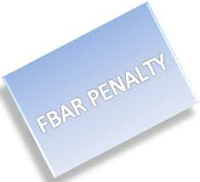According to DoJ, a former CPA Indicted for Failing to Report Foreign Bank Accounts and Filing False Documents with the IRS A federal grand jury returned a superseding indictment charging Brian Booker, a former resident of Fort Lauderdale, Florida, whose business specialized in international trade, with failing to file Reports of Foreign Bank and Financial Accounts (FBARs) and filing false documents with the Internal Revenue Service (IRS).
According to the superseding indictment, Booker, a former Certified Public Accountant, owned a cocoa trading company that was organized under the laws of the Republic of Panama. Booker allegedly operated that company from Venezuela, Panama, and his former residence in Fort Lauderdale, Florida. The superseding indictment further alleges that, for calendar years 2011 through 2013, Booker failed to disclose his interest in financial accounts located in Switzerland, Singapore, and Panama on annual Reports of Foreign Bank and Financial Accounts (FBARs) as required by law. Booker also allegedly filed false individual income tax returns for tax years 2010 through 2012 that failed to report to the IRS all of Booker’s foreign bank accounts.
Booker is also charged with filing a false “Streamlined Submission” in conjunction with the Streamlined Domestic Offshore Procedures. The IRS Streamlined procedures allowed eligible taxpayers residing within the United States, who failed to report gross income from foreign financial accounts on prior tax returns, failed to pay taxes on that gross income, or who failed to submit an FBAR disclosing foreign financial accounts, to voluntarily disclose their conduct to the IRS. The superseding indictment alleges that Booker’s Streamlined submission falsely claimed that his failure to report all income, pay all tax, and submit all required information returns, such as FBARs, was due to non-willful conduct.
If convicted, Booker faces a maximum sentence of five (5) years in prison for each count (15 years in total) relating to his failure to file an FBAR. He also faces a maximum sentence of three (3) years in prison for each of the counts related to filing false tax documents (another 9 years in total). An indictment is an accusation. A defendant is presumed innocent unless and until proven guilty.
The linchpin for qualification for the Streamlined Domestic Offshore Filingis that the taxpayer must certify that their failure to report the income and/or file a correct FBAR report resulted from non-willful conduct.
Am I “non-willful”?
For purposes of the streamlined procedures, non-willful conduct is conduct that is due to negligence, inadvertence, or mistake or conduct that is the result of a good faith misunderstanding of the requirements of the law. The vast majority of taxpayers having previously undisclosed interests in a foreign financial account or asset likely believe they are “non-willful.” However, the real issue is whether the IRS will agree.
Be cautious when certifying non-willful status to the government.
The government may have or subsequently receive information that does not support such status. All relevant facts and circumstances must be carefully analyzed before making a determination regarding the submission of a “non-willful” certification requesting participation in the Streamlined Filing Compliance Procedures.
Will They Actually Inquire Regarding the “Non-Willful” Certification?
The IRS has indicated it will review each certification of non-willful status seeking participation in the streamlined procedures.
Will the IRS Interview the Taxpayer?
Further questions often lay within the responses to each of the foregoing questions. An interview by an IRS examiner (in person or by phone) should be anticipated in most cases and are more likely with respect to resident taxpayers.
Those directly involved in creating and maintaining the foreign account and assets are the only ones capable of determining non-willful status. If such status is not supported by sufficient objective facts, consider other methods of coming into compliance, including the OVDP.
Read more at: Tax Times blog












